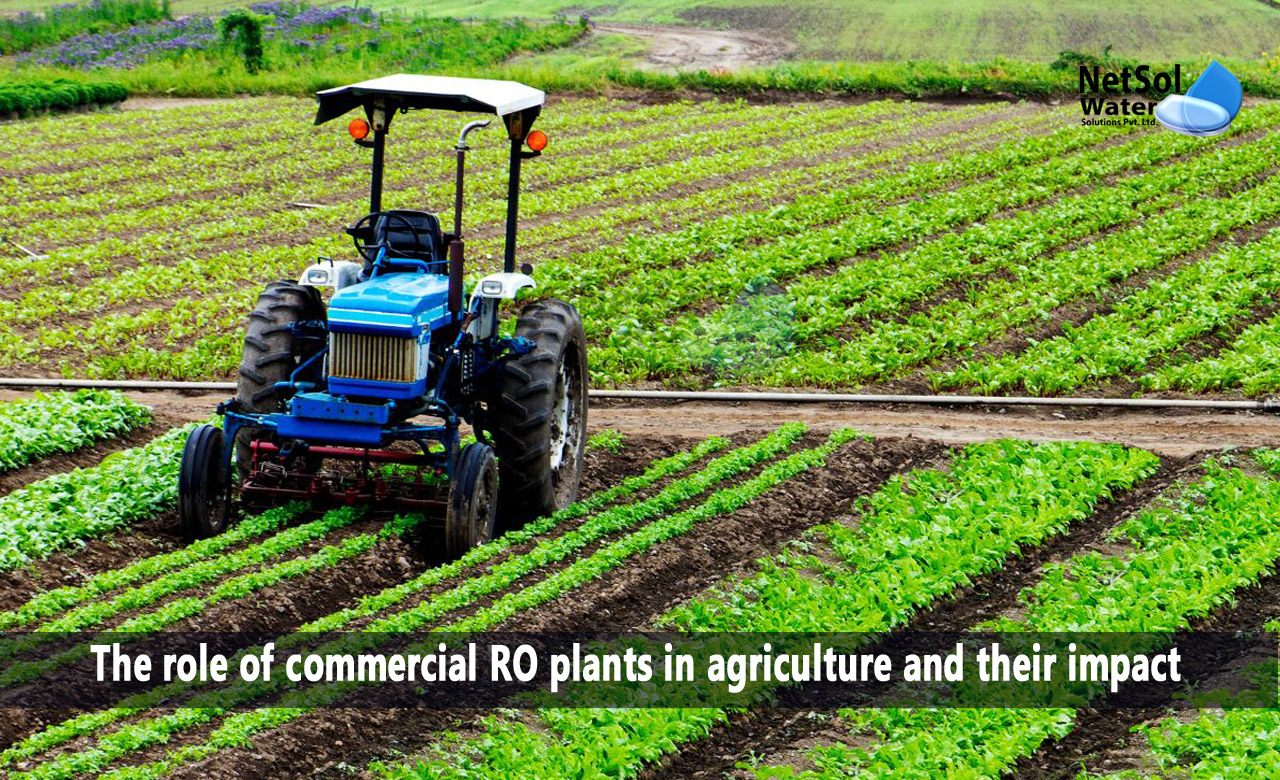What is the role of commercial RO plants in agriculture?
Agriculture is the backbone of our society, and the efficient utilization of water resources is crucial for sustainable food production. In recent years, commercial reverse osmosis (RO) plants have gained recognition as valuable tools for optimizing irrigation water and maximizing crop yields.
Here we will explore the role of commercial RO plants in agriculture and their impact on irrigation water management and crop yield optimization.
The Need for Efficient Irrigation Water Management:
1. Water Scarcity Challenges in Agriculture
Water scarcity is a significant concern in agriculture, with many regions experiencing limited freshwater resources. Efficient utilization and management of irrigation water are essential to ensure adequate water supply for crops while minimizing wastage and optimizing water use efficiency.
2. Impact of Poor Water Quality on Crop Yield
Poor water quality, often characterized by high salinity and the presence of contaminants, can have detrimental effects on crop yield. It can lead to reduced water uptake, nutrient imbalances, and soil degradation, negatively impacting plant health and productivity. Addressing water quality issues is vital to maximize crop yield potential.
Role of Commercial RO Plants in Agriculture:
1. Water Purification and Salinity Control
Commercial RO plants are highly effective in purifying water by removing contaminants, including dissolved salts, minerals, and organic matter. By using RO technology, agricultural operations can significantly reduce the salinity levels in irrigation water, ensuring a more favorable environment for plant growth and development.
2. Enhanced Water Use Efficiency
RO plants play a crucial role in optimizing water use efficiency in agriculture. By purifying irrigation water, they minimize the risk of clogging and damage to irrigation systems caused by the presence of suspended solids and impurities. This leads to improved water distribution, reduced water losses, and enhanced irrigation efficiency.
3. Nutrient Management and Crop Health
Commercial RO plants can also contribute to better nutrient management in agriculture. By eliminating harmful substances and contaminants from irrigation water, RO-treated water provides plants with a cleaner and more suitable nutrient supply. This promotes healthy plant growth, improves nutrient uptake, and minimizes the risk of nutrient imbalances or toxicities.
Impact on Crop Yield Optimization:
1. Improved Plant Productivity
Optimizing irrigation water quality through commercial RO plants positively impacts crop yield optimization. High-quality water free from salts and contaminants ensures better nutrient availability, reduces plant stress, and promotes optimal physiological functioning. This, in turn, enhances plant productivity and contributes to higher crop yields.
2. Disease and Pest Control
Waterborne pathogens and pests pose significant threats to crop health and yield. By purifying irrigation water, commercial RO plants help reduce the presence of these harmful agents, minimizing the risk of disease outbreaks and pest infestations. This contributes to a healthier crop ecosystem and protects against yield losses caused by these factors.
3. Long-Term Soil Health
Using RO-treated water for irrigation mitigates the risk of soil degradation and salinization. Salts and contaminants present in poor-quality water can accumulate in the soil over time, leading to reduced soil fertility and productivity. By providing clean water, commercial RO plants support long-term soil health, preserving its natural fertility and structure.
Summary:
Commercial RO plants offer significant advantages for agriculture, particularly in the realm of irrigation water management and crop yield optimization. These plants provide purified water, reduce salinity levels, enhance water use efficiency, and improve nutrient availability. By utilizing RO-treated water, agricultural operations can achieve higher crop yields, minimize disease and pest pressures, and promote long-term soil health. Embracing commercial RO technology in agriculture contributes to a sustainable and efficient approach to water management, ensuring the continued success of our agricultural systems.
Leading manufacturer of sewage treatment plants in India.
Netsol Water is the leading manufacturer, supplier, and exporter of a quality selection of water treatment, and wastewater treatment products in India, by using advanced sewage treatment methods.
RO plants, water softeners, ETPs, STPs, DM plants, AMC, O&M, Ultra filtration, UV, Ozonation, ZLD plants, Anoxic tanks, and other goods and services are available from us. We also provide services to businesses in sectors including automotive, pharmaceutical, textile, pulp & paper, beverages, refineries, schools, hospitals, office buildings, and hotels, among others.
Netsol Water is Greater Noida-based leading water & wastewater treatment plant manufacturer. We are industry's most demanding company based on client review and work quality. We are known as best commercial RO plant manufacturers, industrial RO plant manufacturer, sewage treatment plant manufacturer, Water Softener Plant Manufacturers and effluent treatment plant manufacturers. Apart from this 24x7 customer support is our USP. Call on +91-9650608473, or write us at enquiry@netsolwater.com for any support, inquiry or product-purchase related query.



